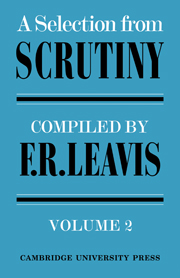6 - ‘AS YOU LIKE IT’
Published online by Cambridge University Press: 04 August 2010
Summary
It is a commonplace that Jaques and Hamlet are akin. But it is also a commonplace that Jaques is an intruder into As You Like It, so that in spite of the kinship the plays are not usually held to have much connection. I have begun to doubt whether not only As You Like It and Hamlet, but almost all the comedies and the tragedies as a whole are not closely connected, and in a way which may be quite important.
Recent criticism of Shakespeare has directed itself with profit upon the tragedies, the ‘problem plays’, and certain of the histories. The early comedies, on the other hand, have either been disparaged or entirely overlooked. Yet the same criticism owes part of its success to a notion of what it calls Shakespeare's ‘integrity’; his manifold interests, it has maintained, being co-ordinated so as rarely to thwart, regularly to strengthen one another. Hence he was alert and active as few have been, while his writing commanded not part but the whole of his resources.
Such a notion seems sound and proves useful. Belief in an author's integrity, however, ought to forbid the dismissal of any part of his work, at least its hasty dismissal. The comedies, to which he gave a number of years of his life, are no insignificant part of Shakespeare's. If it is true that they shed no light on the tragedies nor the tragedies on them, it would seem he deserves credit for a unique dissipation rather than concentration of his powers.
- Type
- Chapter
- Information
- A Selection from Scrutiny , pp. 172 - 191Publisher: Cambridge University PressPrint publication year: 1968



